I’ve overheard several people describe Endless Winter: Paleoamericans (EW) as a collection of minigames, or a series of different mechanisms bolted together. I think quite the opposite. It is a quintessentially modern hobbyist game that has clearly seen meticulous development and playtesting, and a game where there are many pathways to victory. It is one of the cleaner designs I’ve played in recent memory—in fact, I find it a bit too clean, a bit too smooth.
The premise of EW is that you’re managing a tribe of cave people (I’m no scientist, but this game has no pretensions towards any kind of historical or scientific fidelity), and you wanna grow that tribe, build camps, and probably lay down some big flat megalith stones.
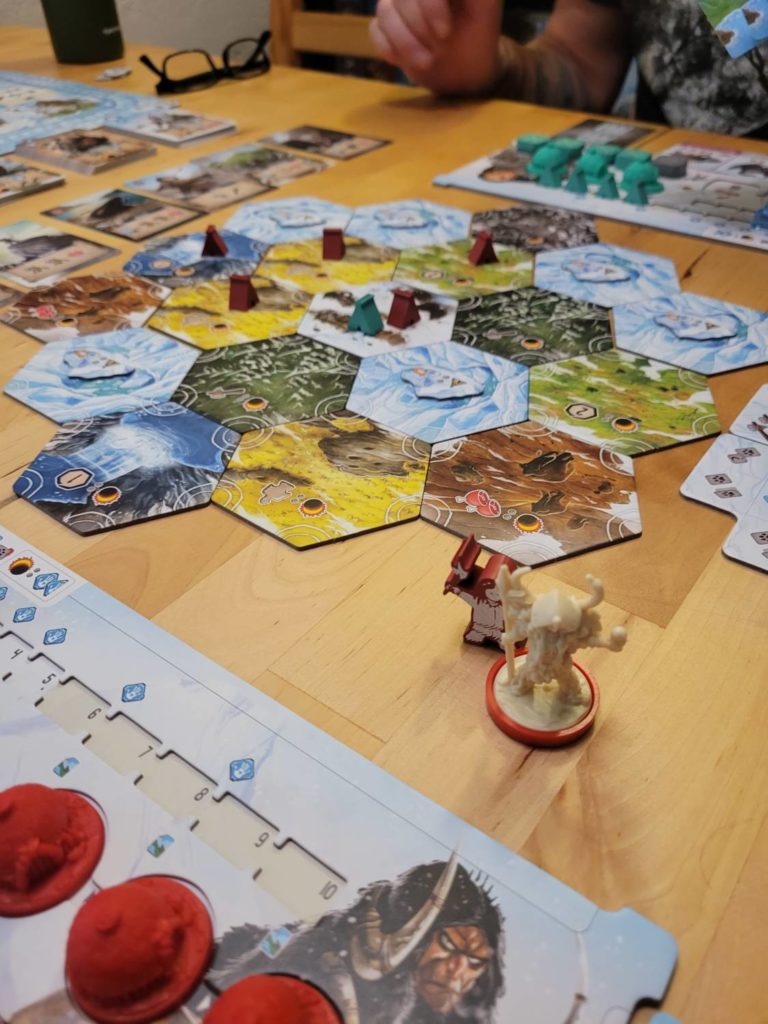
It’s easy to see why people would describe the game as a mishmash of mechanisms. There’s a shared random hex tile board where you place camps to try and capitalize on scoring opportunities; a separate board where you build a little stacking tile puzzle; a market for buying fancy power cards; a market for adding people to your deck; a set collection puzzle with animal cards; deckbuilding; worker placement; and, TWO tracks. It’s basically the greatest hits of eurogames from the past two decades, rolled into one paleolithic package.
Rather than describing each mechanism in detail, I’ll give you a basic overview of what you do on a turn. First, you play culture cards from your hand (there is a departure from many deckbuilding games where you have no hand limit, nor is there a requirement to play or discard all of your cards). Culture cards basically give you great little benefits, and they’re all unique, so this is where player differentiation comes from. After you’ve played culture cards, you select an action with one of the three workers you have for the round, and you play additional cards from your hand to get resources (labor, food, and axes) that help you do the action where you’ve placed your worker. The action spaces on the board will add cards to your hand, allow you to manipulate the hex board, bury cards from your deck for endgame scoring, and hunt animals.
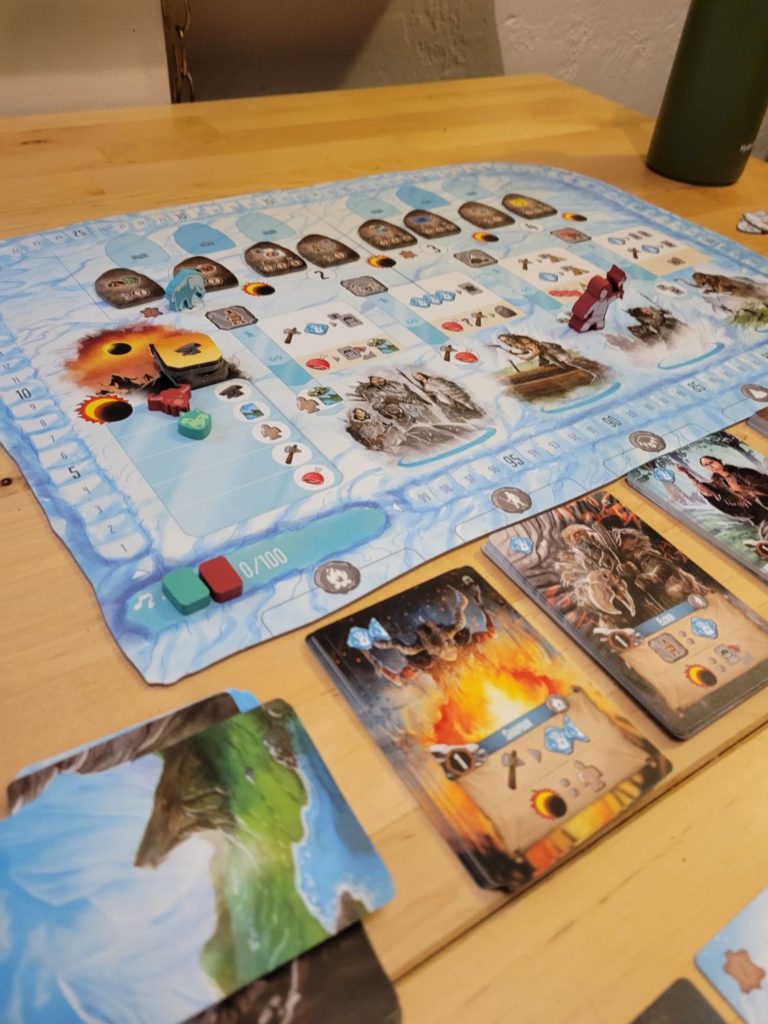
After 3 rounds of actions, there is an “eclipse phase” where players make a blind bid using their remaining cards. This bid determines turn order for the next round, as well as generating additional benefits depending on the cards played.
Again, trying to explain exactly how everything works would take a long time and will not really give you a better sense of how the game works, but the core decision loop of much of what you do is a balancing act. For example, when you move camps on the main board, you’re trying to win majority competitions for bonuses on the tiles which only trigger during the eclipse phase. You can turn camps in for villages, which control more area and are more powerful, but they return camps to your player board, which restricts how much of the food resource you can store. Each action has a built-in trade-off.
The game wants you to remain flexible. Overspecializing can result in having too much of one resource and not enough of others, so what you want to do is try to keep a reserve of dry powder in case you aren’t able to accomplish the task that you were setting out to do.
EW does have a lovely power curve. As long as you pursue a pathway through the game, you’ll find yourself entering the fourth and final round of the game ready to do some serious combos. In my last game, I entered the final round with 10 cards in my hand and proceeded to do some seriously empowered stuff. The game captures the feeling of starting as a little tiny group and growing into a big ol’ civilization, usually one that’s fixated on burying people at an alarming rate or building tons of megaliths.
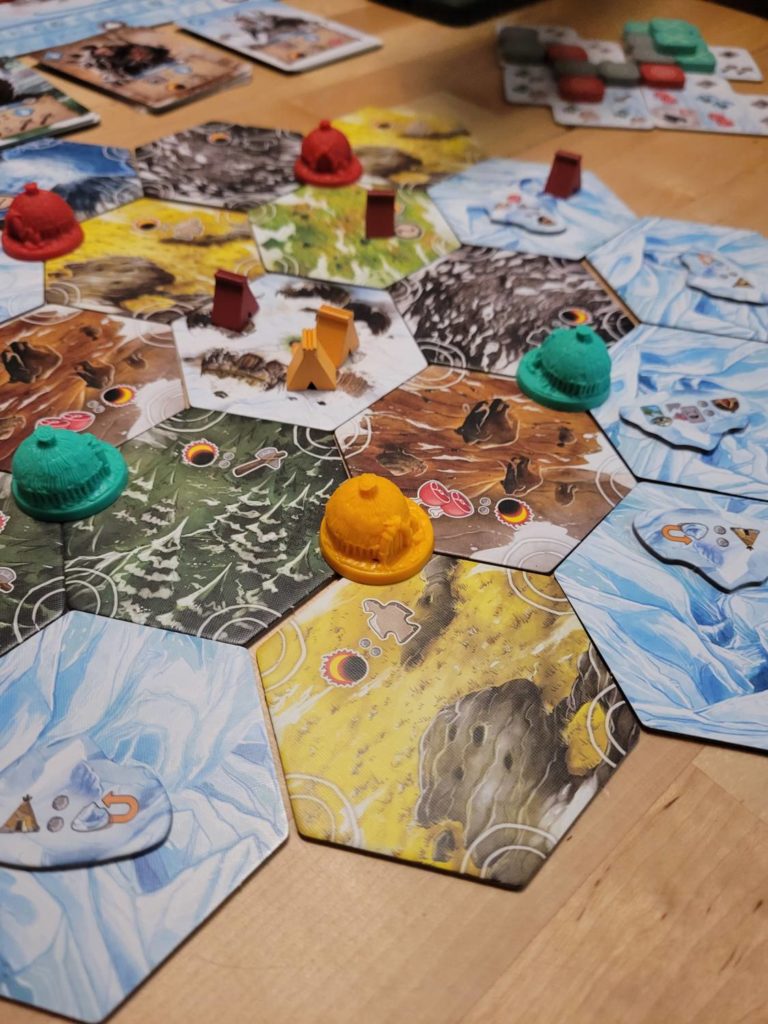
I have not played any of the expansion materials that shipped with the game, so I cannot speak for what they might offer, but my primary criticism of the game is that for a game about surviving in a deadly winter expanse, you can’t really make much in the way of mistakes, save one: failing to chain actions. Regardless of which path of the game you choose, if you select a path through the game that lines you up with the timing of scorings and you do turns where you set yourself up to get a lot of stuff, you’ll generally do OK. There are many ways to win the game, and all of them seem pretty well-balanced when executed correctly.
Because the game rewards chaining actions together, it’s not so important what those actions are as long as they get you more stuff, because you’ll likely find a use for that stuff. This means that the occasional bit of player interaction you encounter, where someone beats you up the Honor track, or someone builds a megalith stone in a spot you need, or someone claims an area on the map you need, is not particularly meaningful. I’m curious to try some of the expansions released with the game because my main criticism of the game is that it’s pretty hard to mess up, be outfoxed, or make mistakes, and because of the balance of everything in the game, winning feels more like an afterthought.
Also, I don’t recommend a game with more than 3 players. The interaction is not quite substantive enough to balance out the wait time as people do bigger and bigger turns, and the game doesn’t become much more dynamic or textured with more people playing it. Perhaps that was the intent, but this is a common concern with many combo-heavy eurogames.
As a synthesis or greatest hits of many popular mechanics from the past few years, EW is a major success. But as a game where you fight tooth and nail to survive in a hostile world against other players, it doesn’t really deliver on some of its aesthetic promises. Once you’ve got the winter wastes under control, everything else is gravy, rather than a battle for survival in an endless winter.


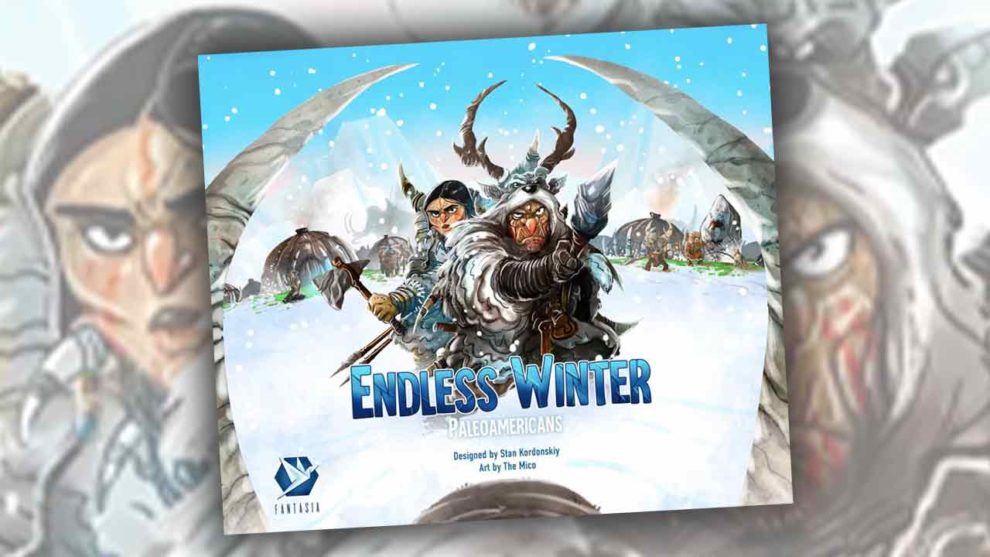

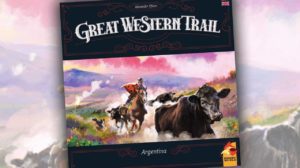


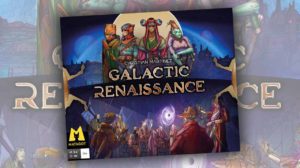




Add Comment